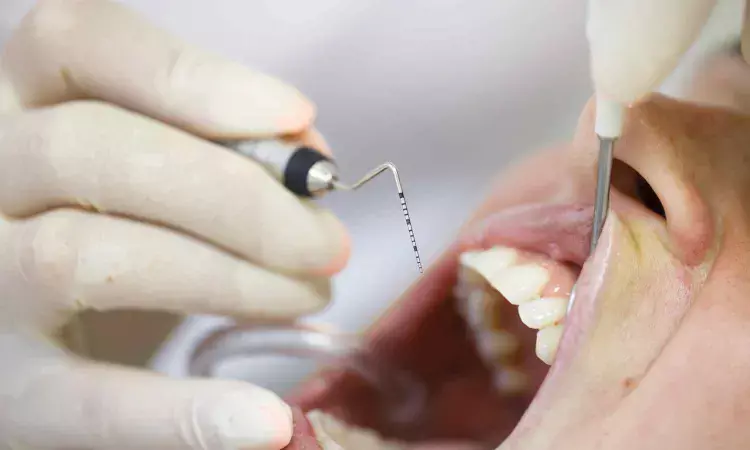- Home
- Medical news & Guidelines
- Anesthesiology
- Cardiology and CTVS
- Critical Care
- Dentistry
- Dermatology
- Diabetes and Endocrinology
- ENT
- Gastroenterology
- Medicine
- Nephrology
- Neurology
- Obstretics-Gynaecology
- Oncology
- Ophthalmology
- Orthopaedics
- Pediatrics-Neonatology
- Psychiatry
- Pulmonology
- Radiology
- Surgery
- Urology
- Laboratory Medicine
- Diet
- Nursing
- Paramedical
- Physiotherapy
- Health news
- Fact Check
- Bone Health Fact Check
- Brain Health Fact Check
- Cancer Related Fact Check
- Child Care Fact Check
- Dental and oral health fact check
- Diabetes and metabolic health fact check
- Diet and Nutrition Fact Check
- Eye and ENT Care Fact Check
- Fitness fact check
- Gut health fact check
- Heart health fact check
- Kidney health fact check
- Medical education fact check
- Men's health fact check
- Respiratory fact check
- Skin and hair care fact check
- Vaccine and Immunization fact check
- Women's health fact check
- AYUSH
- State News
- Andaman and Nicobar Islands
- Andhra Pradesh
- Arunachal Pradesh
- Assam
- Bihar
- Chandigarh
- Chattisgarh
- Dadra and Nagar Haveli
- Daman and Diu
- Delhi
- Goa
- Gujarat
- Haryana
- Himachal Pradesh
- Jammu & Kashmir
- Jharkhand
- Karnataka
- Kerala
- Ladakh
- Lakshadweep
- Madhya Pradesh
- Maharashtra
- Manipur
- Meghalaya
- Mizoram
- Nagaland
- Odisha
- Puducherry
- Punjab
- Rajasthan
- Sikkim
- Tamil Nadu
- Telangana
- Tripura
- Uttar Pradesh
- Uttrakhand
- West Bengal
- Medical Education
- Industry
Periodontitis and Atrial Fibrillation: Preclinical Research Reveals A Bacterial Connection

Japan: A recent study published in the journal Circulation has highlighted a potential link between severe gum disease and atrial fibrillation (AF), a common heart rhythm disorder. Researchers found that Porphyromonas gingivalis (P. gingivalis), a bacteria responsible for periodontitis, may travel from the mouth to the heart, worsening atrial fibrosis and increasing the risk of AF.
Atrial fibrillation occurs when the heart beats irregularly, leading to a higher risk of stroke and other cardiovascular complications. Atrial fibrosis, which involves thickening and scarring of the heart’s atrial tissue, plays a key role in the development and persistence of AF. The researchers note that recent studies suggest a link between gum disease and atrial fibrillation (AF), but the exact reasons remain unclear. Porphyromonas gingivalis, a harmful bacteria responsible for gum infections, is known to be highly infectious.
Against the above background, Mutsumi Miyauchi, Oral and Maxillofacial Pathobiology, Graduate School of Biomedical and Health Sciences, Hiroshima University, 1-2-3 Kasumi, Minami-ku, Hiroshima, Japan, and colleagues focused on P. gingivalis and explored its connection to gum disease, its movement to the heart, and its role in atrial fibrosis and atrial fibrillation.
For this purpose, the researchers conducted an experiment using P. gingivalis–infected mice by injecting the bacteria into their molar pulp. They used immunohistochemistry to track the bacteria’s location and a specialized DNA test to detect P. gingivalis in the left atrium. AF inducibility was assessed through intracardiac stimulation. Additionally, left atrial tissue samples were collected from 68 AF patients, who underwent a periodontal examination before surgery. Researchers measured periodontal disease severity using quantitative indices and analyzed bacterial presence in heart tissue through a polymerase chain reaction test. Atrial fibrosis was evaluated using Azan-Mallory staining.
The study led to the following findings:
- Immunohistochemistry and DNA analysis confirmed that P. gingivalis traveled from dental granulomas to the left atrium through the circulatory system in infected mice.
- P. gingivalis–infected mice showed increased atrial fibrosis (21.9% vs. 16.3%) and higher AF inducibility (30.0% vs. 5.0%) compared to control mice.
- Increased GAL3 (galectin 3) and transforming growth factor-beta 1 levels were detected in the left atrium of infected mice.
- Immunohistochemistry confirmed the presence of P. gingivalis in human atrial tissue.
- The bacterial load of P. gingivalis in human atrial tissue was positively correlated with periodontal epithelial surface area, periodontal inflamed surface area, and the extent of atrial fibrosis.
Preclinical research suggests that P. gingivalis, a bacteria linked to gum disease, may travel to the left atrium, contributing to atrial fibrosis and worsening atrial fibrillation. The severity of periodontitis correlates with higher bacterial presence in the heart, indicating a possible causal link.
"Managing gum disease may help reduce AF risk by preventing bacterial translocation. Additionally, targeting P. gingivalis could offer a new therapeutic approach for AF treatment beyond conventional risk factor management," the authors concluded.
Reference: https://doi.org/10.1161/CIRCULATIONAHA.124.071310
Dr Kamal Kant Kohli-MBBS, DTCD- a chest specialist with more than 30 years of practice and a flair for writing clinical articles, Dr Kamal Kant Kohli joined Medical Dialogues as a Chief Editor of Medical News. Besides writing articles, as an editor, he proofreads and verifies all the medical content published on Medical Dialogues including those coming from journals, studies,medical conferences,guidelines etc. Email: drkohli@medicaldialogues.in. Contact no. 011-43720751


